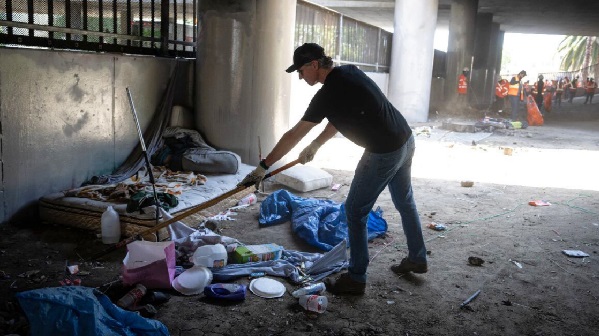LOS ANGELES – In a dramatic escalation of California’s homelessness crisis, Governor Gavin Newsom has taken the extraordinary step of personally clearing homeless encampments in Los Angeles, directly challenging city and county officials who have resisted his statewide mandate to dismantle such camps.
Governor’s Bold Move
On August 8th, Newsom, dressed casually in a cap, T-shirt, and jeans, joined cleanup crews to remove tents from beneath the 5 Freeway in LA’s Mission Hills area. This hands-on approach came after his executive order last month demanding immediate removal of homeless encampments across the state met with resistance from Los Angeles city and county governments.
Threats of Budget Cuts
Newsom has threatened to withhold homeless-related funding from local governments that fail to comply with his order. He argued that there’s no need to provide budgets to cities and counties that are inactive on the homelessness issue, despite receiving substantial state support.
Los Angeles Pushback
LA Mayor Karen Bass and the County Board of Supervisors have openly defied the governor’s mandate, insisting on maintaining their existing approaches:
- Bass champions the “Inside Safe” program, which prioritizes providing shelter before clearing encampments.
- The County Board passed a resolution against forced removals, emphasizing care over enforcement.
A Democratic Party Divide
This conflict highlights an ideological split within the Democratic Party on addressing homelessness:
- Newsom, traditionally seen as progressive, is taking a harder line on encampment removals.
- Bass and LA County leaders are advocating for more accommodating policies.
The Scale of California’s Crisis
- California houses approximately 180,000 homeless individuals, about one-third of the nation’s total homeless population.
- The state has invested over $1 billion in encampment clearances and $24 billion in shelter provisions, according to the governor’s office.
As this situation unfolds, it represents a critical juncture in California’s approach to one of its most pressing social issues, with national implications for urban policy and homelessness strategies.






